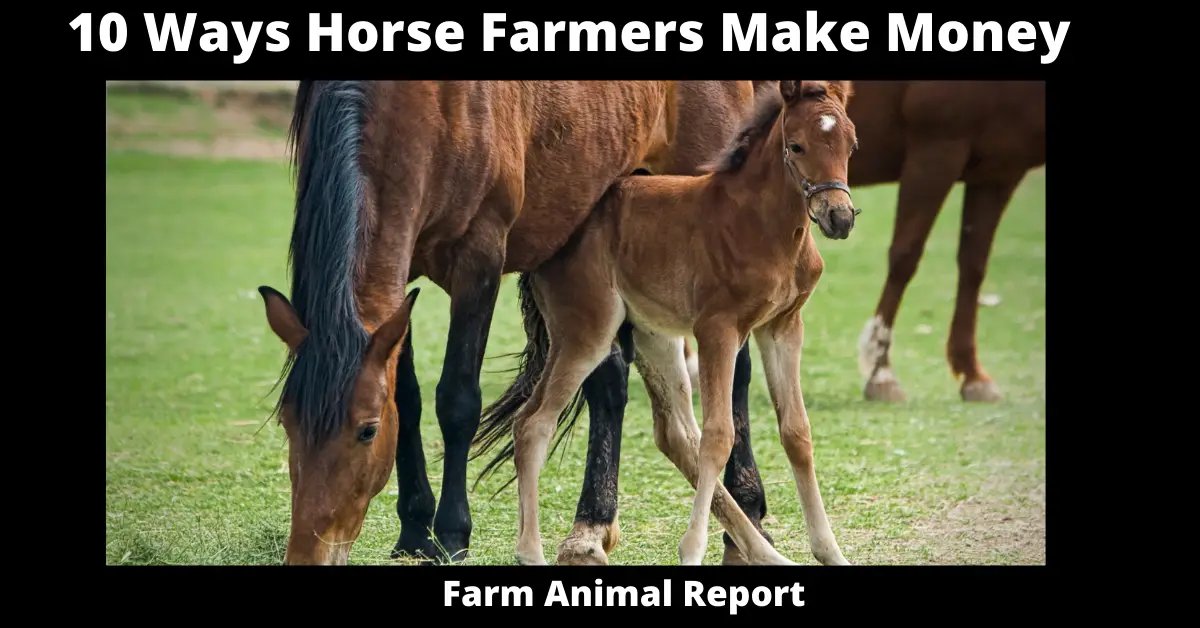As a General Rule Horse farms Make money 1) Breeding farms make money by creating more horses and selling them ( an Arabian $25,000 – $300,000. 2) With annual salaries ranging from $49,500 to $16,500, most Horse Farm jobs pay between $22,000 (25th percentile) and $32,500, with top earners earning $40,000 in the United States. 3) Thoroughbred racehorse, who has earned stud fees of up to $500,000
Ways Horse Farmers make Money.
Ways Horse farmers make Money – The wild horses were probably first hunted for food in prehistoric times. Domestication, according to research, occurred approximately 6,000 years ago. The horse is believed to have been invented by an Indo-European tribe that lived in the steppes north of the chain of mountains that separates the Black and Caspian seas. The horse rapidly evolved into its current form as a result of climate, food, and humans.
Check Out Amazon’s Resources for Raising and Training Horses
The horse’s relationship with humans has always been unique. The horse is both a companion and a friend. It has plowed fields and harvested crops, hauled goods and transported passengers, tracked game and herded cattle, and transported combatants into battle and adventurers to unknown lands. It has provided recreational opportunities through jousting, tournaments, carousels, and the riding sport.
As property values increase and the cost of daily equine management increases, keeping a few horses on one’s property becomes more expensive. Property and horse owner throughout the United States are engaging in a variety of activities to generate revenue from their farms and acreages without operating commercial boarding stables or becoming professional coaches.
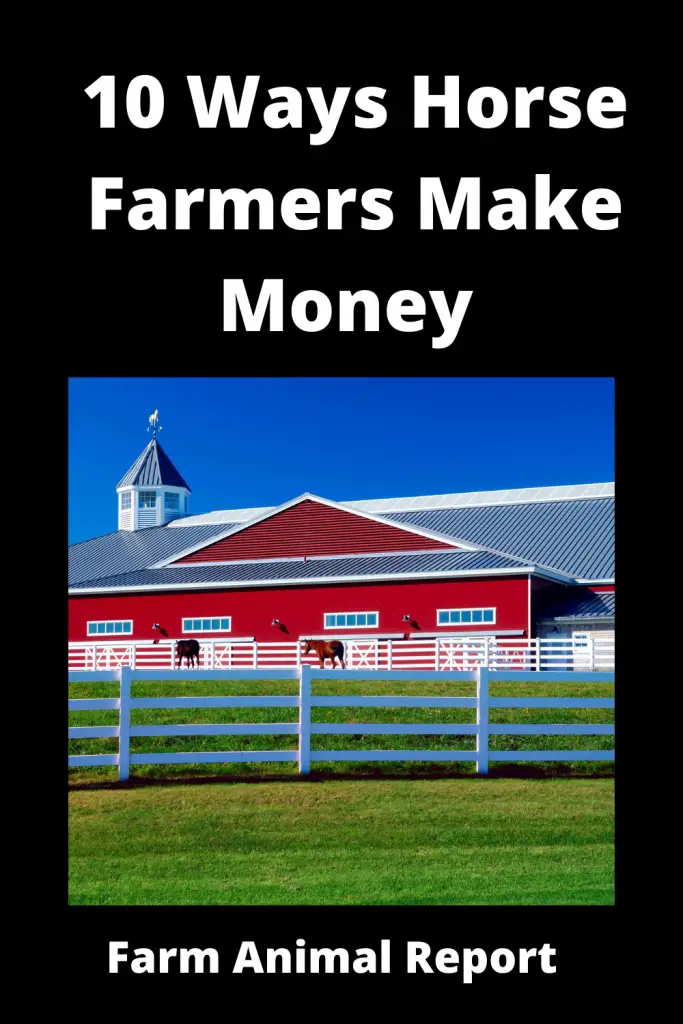
While each potentially lucrative activity has several advantages and disadvantages that vary according to the size, layout, and infrastructure of the property and the owner’s interests and abilities, there are numerous opportunities for generating additional revenue. Horse owner can begin earning extra money from their property by implementing a few of the 24 innovative ideas summarized below.
Naturally, before beginning any new activities, be sure to research zoning bylaws, insurance and liability concerns, tax implications, and business requirements associated with the proposed action and be aware of neighbors who may be concerned about new activities in the neighborhood.
10 Ways Horse Farmers Raise Horses to make Money
Put a Half Lease on your Horse.
Do you ever feel guilty for not riding as frequently as you’d like? If this is the case, a half-lease on your horse may be the solution. If you board horses, charge half the normal boarding fee, and presto! You’ve halved your monthly boarding horses expenses. Additionally, charging half of the shoeing fees is reasonable. If your lessee is also a better rider than you, you will be compensated for not having to pay a trainer to train your horse.
Assemble a leasing agreement and a hold harmless agreement with your lessee. The leasing agreement should specify how many (and possibly which) days your lessee is permitted or expected to ride. The last point you should do is drive out to the barn to ride and discover that your lessee is already on your horse. The hold harmless clause shields you from liability if your lessee is injured while riding. Additionally, ensure that the lessee rides as well as you do. Otherwise, your horse will develop a sour disposition and will lose her conditioning and training.
Take in the Boarder.
If you board a horse on your property, for ho think taking in one or more boarders at a rate slightly less than what local horse boarding business facilities charge.
The boarding horses fee you charge will cover the cost of feeding and housing the horses your board, as well as provide you with more money. If you choose your boarders carefully, you’ll also make some new friends who share your passion for horses.
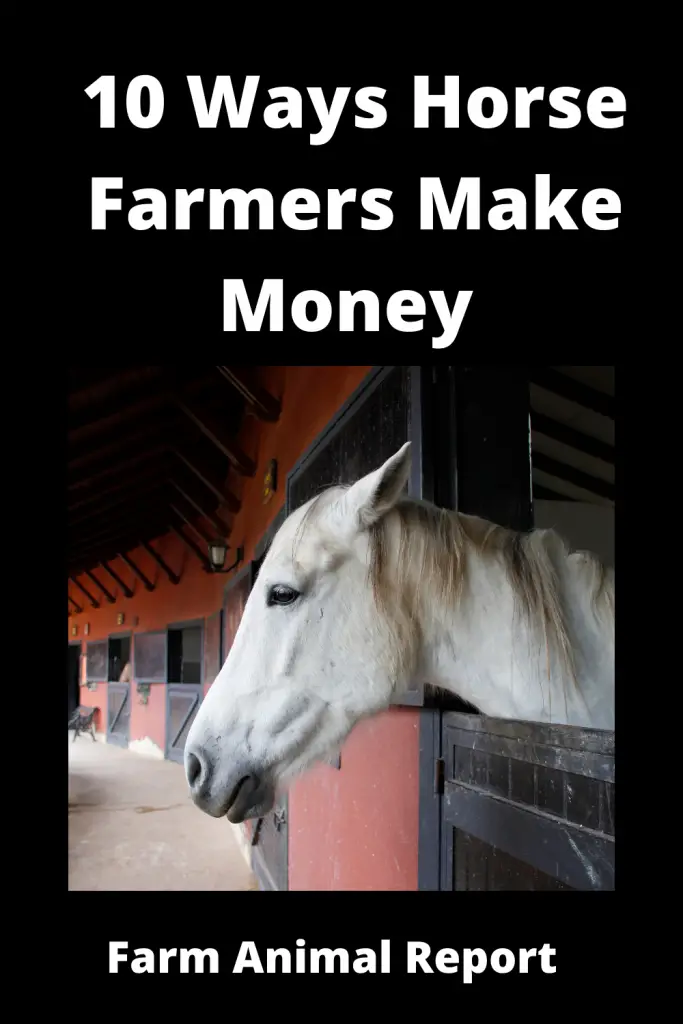
The more horses there are, the more work there is. You can improve some of this burden by hiring a 4-H or other trustworthy student to clean stalls for you, either paying them or allowing them to ride your horse once or twice a week. Vacations will become more difficult now that you are responsible for all the horses on your property. You’ll need to organize for someone to look after the horses while you’re away. Additionally, you will be responsible for responding to any injuries or emergencies that occur, mainly if you cannot contact the horse owners.
Make sure your boarders sign a boarding agreement that includes deworming, vaccination, and teeth floating requirements. Ascertain that the deal consists of emergency contact information for both the horse and the boarder (horse owners, veterinarian) (spouse, parent, doctor). Additionally, ensure they sign a hold harmless agreement, which will shield you from liability if they are injured while riding or handling horses. Further, verify that your homeowner’s insurance policy covers the care, custody, and control of boarded animals.
Charge for Body-clipping and Braiding services.
Learn how to clip horses’ bodies and braid their manes in preparation for shows. In most areas, you can earn upwards of $50 per hour for these services.
Rent your Arena.
If you board your horses at your home and have an arena, you can rent out the arena to trainers or riders in your area in exchange for a rental fee or work on your property. When trainers use the arena, it is customary for them to pay you a percentage of their lesson or training fee. The percentage can be from 25% to 50%, but you should aim for the lower end of the range unless you have an extremely high-quality arena.
Assure that everyone signs a waiver of liability. Additionally, trainers should insure you professionally. If they are sued, the plaintiff will likely sue you as well, as the lessons or training took place on your property.
Become an affiliate Seller – ebooks
If you are having a large social media following, this is an excellent way to Earn Extra Money. Become a member of an affiliate program such as Amazon, Commission Junction, Pepper jam, or Vislink. Recommend the products on this page to your friends based on your personal experience or product ratings. You earn a payment whenever someone clicks on a product link and purchases it.
How Much Horse Owners / Horse Person Make
As of Jun 26, 2021, the average annual salary for jobs in the horse industry in the United States is $29,187. In case you require a quick salary calculator, that equates to approximately $14.03 per hour. This equates to $561 per week or $2,432 per month.
With annual salaries ranging from $49,500 to $16,500, most Horse Farm jobs pay between $22,000 (25th percentile) and $32,500, with top earners earning $40,000 in the United States. The average salary range for a Horse Farm job is quite wide (up to $10,500), indicating that there may be numerous opportunities for advancement and increased pay depending on skill level, location, and years of experience. Individuals employed in the Horse Farm category in your area earn an average annual salary of $29,187, which is identical to the national average annual salary of $29,187. Ranks first out of fifty states in terms of horse farm job salaries.
There’s an Old Saying – to Make a Million Dollars in the Horse Business – Start with 5 Million
Types of Animals
With over 300 horse breeds, it can be overwhelming to comprehend the various types of horses and their purposes, for horse owners.
Draft Horses
Draft horses are typically large, powerful, and heavy. They weigh an average of over 1,600 pounds and measure 64 inches in length. They were bred to pull and carry heavy loads due to their ability to draw double their body weight. They were historically used for a variety of purposes, from farm work to transporting soldiers during battles. These horses are typically calm and level-headed. Cold-blooded horses are large, strong horses bred for work with a quiet temperament. Clydesdale, Breton, Shire, and Boulonnais are all examples of draft horses.
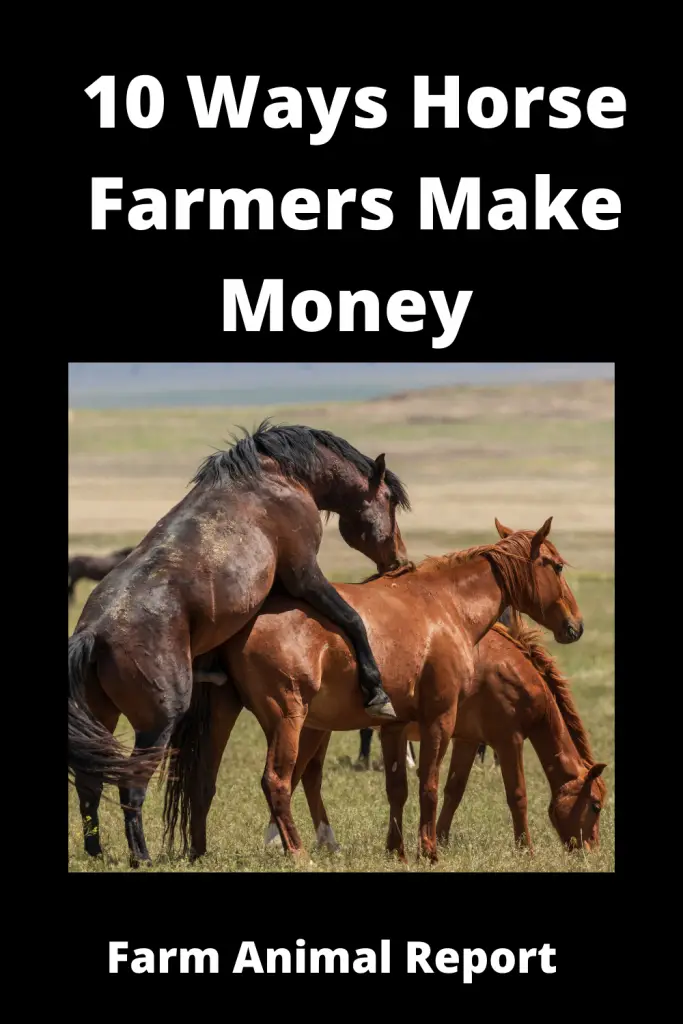
Light Types
Light horses have a more excellent range of characteristics and frequently vary in height, weight, build, and color. They are all bred with an emphasis on speed, agility, endurance, and riding. These horses were bred to be under the saddle of a rider and were used for all types of riding. These horses are classified as horses because they have a high energy level, are quickly excited, and are quick on their feet. Hanoverian, Friesian, Paso Fino, and Lusitano are all examples of light-typed horses.
Gaited Types
These horses are similar to light types in that they were bred for riding but are distinct in that they were bred for a more comfortable ride. They are capable of running walks, foxtrots, and more. Historically, these horses were reserved for “gentlemen” such as generals, officers, and prosperous men. Icelandic, Campiero, and Campolina are all examples of this breed.
Warm Blood Types
Warm-blooded horses are typically large, strong, and athletic. They are classified as middleweight horses and are classified as warm-blooded due to their admixture of hot and cold-blooded horses. They have rational attitudes and a lot of energy. This high-energy horse is ideal for dressage, equestrian Olympic sports, and jumping harness. Dutch, Hanovarian, and Swedish are all examples of warmblood types.
Pony Types
Pony horses are significantly smaller than other types of horses—hence the name! Due to their shorter legs, they typically stand less than 5 feet tall. Over 100 breeds of pony have been bred for various purposes, including pulling, packing, harnessing, riding, and jumping. Due to their small size, ponies are extremely popular for sports and recreation, particularly among children. American Miniature, Hacknet, and Gypsy are all examples of ponies.
Best Breeds For Show Jumping Work Trails
The Dutch Warmbloods are by far the most popular choice on many upper-level show jumping circuits, as they possess the size and athleticism required to clear even the most difficult jumps. Additionally, they are well-known for being extremely easy to train, owing to their high intelligence and desire to please their riders. With the appropriate amount of training for intermediate and advanced riders, the Dutch Warmblood has the physical build and mental capacity to compete at the Olympic level in show jumping. The top horse breeds used in amateur and professional showjumping include the following:
Dutch Warmbloods
The Dutch Warmblood is an excellent choice for both novice and professional riders due to its ease of training. They are tenacious in their desire to please their rider and trainer, making them one of the best horses for show jumping at all levels.
Belgian Warmbloods
With some bloodlines possessing the best bone structure of any show jumping horse, the Belgian Warmblood is an excellent choice for confident intermediate and advanced riders looking to transition into the high jumping circuits.
Rhenish Warmbloods
The Rhenish Warmblood is an excellent choice for amateur riders to learn on, as it has an unusually calm and easy-going disposition. Frequently used as a schooling horse, an equestrian can quickly improve their riding skills while mounted on this horse.
Hanoverian
The Hanoverians, renowned for their strong back and legs, are an excellent choice for show jumping at any level. They are intelligent and quick to pick up new tasks, making them ideal for both novice and expert riders.
Oldenburg
Muscular and with a long body, the Oldenburg exemplifies showjumping power. Their strong legs are well-muscled and have thick tendons, enabling them to start and finish high jumps gracefully.
Westphalian
The Westphalian is an excellent choice for riders looking for a willing and spirited horse. They excel at show jumping due to their exceptional athleticism and willingness to learn new tasks from any rider they place their trust in.
Selle Francais
The Selle Francais is an excellent multi-purpose horse. It is a tall and powerful horse. They are a perfect choice for showjumping and eventing and are an ideal horse for riders wishing to progress to higher levels.
Trakehner
Trakehners are alert and intelligent, making them an excellent choice for show jumping at any level. This breed is brimming with vitality and has a strong back and shoulders, making it an ideal choice for riders of all levels of experience.
Holsteiner
The Holsteiner is a calm and laid-back horse frequently seen at the novice level of show jumping. Their temperament is ideal for even the timidest riders, and they have an inherent desire to please, making them ideal for new trainers to work with.
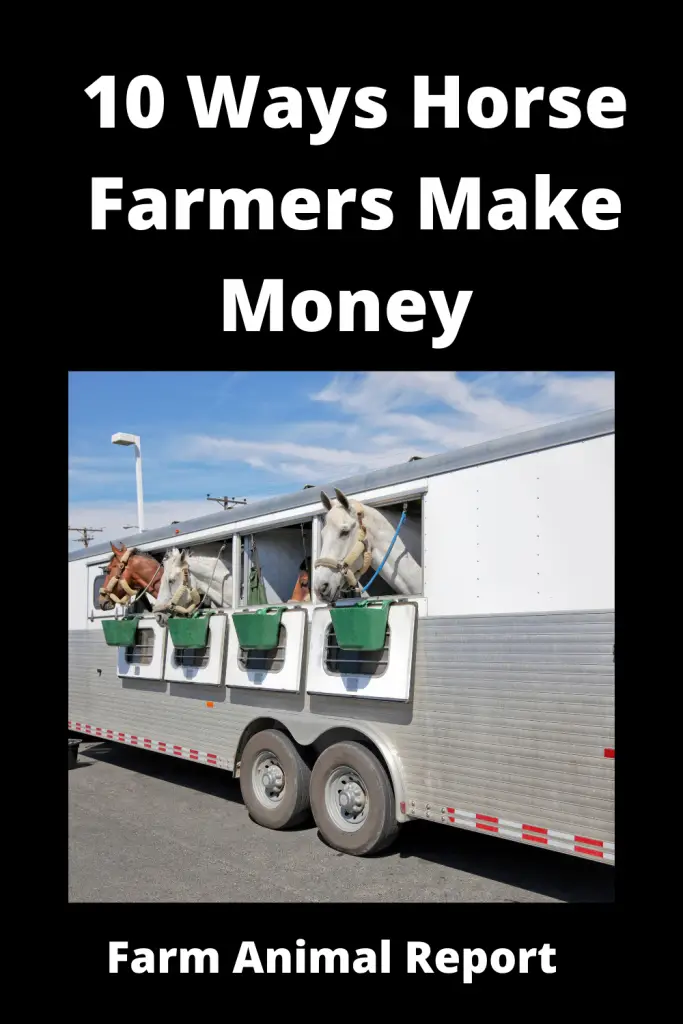
Raising Horses for Breeding Stock
Raising a horse entails feeding, cleaning, caring for, and monitoring your horse 24 hours a day, 365 days a year. These are some of the requirements for successfully raising a horse. A sleeping quarters for your horse, a large paddock for grazing and outdoor exercise horses, food and fresh water, farrier services, and veterinary care.
Some tips for raising your horse at home
- A properly cared-for horse has a life expectancy of 30 to 35 years.
- Companionship is necessary for your horse. Provide your horse with plenty of affection and attention. Occasionally, a companion animal such as another horse or goat is required to keep your horse company when you cannot be with him. Horses are herd animals who do not thrive in isolation.
- Maintain a close eye on your horse’s body condition to ensure he remains in peak condition and does not become obese or lose weight.
- Dietary changes should be made gradually to your horse’s diet.
- Maintain a clean environment for your horse’s feeding and drinking buckets, as well as his living quarters.
- Contact your veterinarian regularly to discuss any changes in your horse’s diet or health.
Some warnings when raising your horse at home
- Raising a horse at home is costly; additional costs always accrue after the initial purchase price. Not commit to raising a horse at your home if you lack the financial means to provide for all of your horse’s needs.
- Be aware of your environment when riding your horse. When a horse spooks at something and you are in its path, you run the risk of being harmed.
- Acquaint yourself with poisonous plants that grow in your areas, such as buttercup, acorn, and oak leaves.
- Regularly inspect grazing areas for toxic plants that could be harmful to your horse.
What Age To Stop Breeding horses
Mares are generally past their reproductive prime when they reach the age of 15 to 16 years. While some mares can carry and deliver healthy foals into their twenties, the majority have already experienced multiple successful pregnancies.
To determine whether a mare is fertile, a veterinarian should perform a breeding soundness exam (BSE); rectal palpation and ultrasound will provide information about the mare’s uterus and ovaries’ health. As mares age, some experience diminished heat cycles; the exam will detect any abnormal structures.
Additionally, the veterinarian may recommend a uterine culture and biopsy; a culture will reveal any infection that may impair a mare’s fertility, while a biopsy will show the details of the uterine lining, possibly detecting abnormalities that are not palpable.
Transportation for Horses
Establishing a horse transport business can be a satisfying way to turn your passion for driving and horses into a revenue-generating endeavor. A basic understanding of horses and their care is critical to your success.
The cost of transport horses will vary according to the type of move, the distance traveled, and other factors unique to your situation. However, the average cost of hiring a professional equine transport company is between $0.75 and $3 per mile. Transporting your horse internationally by air will cost between $2,000 and $10,000 for a one-way flight.
Horse Boarding Business
If you own farmland, consider weathering the economic downturn by renting out your barn to boarders. Due to the economic downturn, you may be scrambling to find ways to turn your passion for horses and interest in the horse industry into a profitable venture. Adding boarding services may be an excellent solution if the groundwork is done carefully. However, whether you have one or ten boarders, horse boarding is a business. And, as with any business, you must resolve organizational, legal, and contractual issues before opening your doors.
Horse Stud Fees
A stud animal is a registered animal that has been retained for breeding purposes. The business of studing a successful racehorse is equally lucrative and risky. Individuals breed horses for profit in their unique ways. Service fees can range from a few hundred dollars for a locally bred male animal to some hundred thousand dollars for the right to breed a champion Thoroughbred racehorse, who has earned stud fees of up to $500,000.
Selling Horse Manure
Horse manure is readily available in many rural areas or through reputable suppliers. It is an excellent and inexpensive fertilizer for plants. Horse manure can provide an immediate boost to new plants while also providing essential nutrients for continued growth. Additionally, it contains slightly more nutritional value than cow or steers manure. You can haul it to a supplier or advertise in the local classifieds to sell the manure and continue operating your horse business. Again, consult with local nurseries to obtain an accurate estimate of what to charge. Cheaper is always preferable. Inform local landscapers that you have compost to sell.
Final Thoughts
Before developing a business plan, purchasing land, and so forth, conduct horse business marketing research. Even if you’ve lived in your neighborhood your entire life, investigate the boarding facilities. Ascertain that you understand what prospective boarders desire and anticipate from a boarding facility. That is the first step toward achievement.
Starting a horse business can be an emotional roller coaster of emotions ranging from excitement at the prospect of being self-employed and finally following a passion for fearing the unknown and anxiety over what is required to succeed.
Before diving headfirst into a new venture that has the potential to change your life, the greatest place to start is by creating a business plan. This plan will assist you in evaluating your current knowledge of yourself and your future business, as well as in communicating that knowledge to others. You’ll discover what it takes to make your business viable and profitable, as well as how to ask the tough questions in advance of any roadblocks.
Jump to Section on Horses
- 10 Ways Horse Farmers Make Money.
- Windswept Legs in Horses
- Can a Horse Swim / Videos
- Why Do Horses Have Manes / Types / Tutorials
- Horse Sheath Yeast Infections – Video Instructions
- How do Horses Clean / Trim their Hooves in the Wild
- Can a Horse Have Too Much Biotin / Excess in Waste
- Do Horse Shoes Hurt the Horse / How to Correctly Shoe Videos
- Will a Horse with Colic Poop
- How Fast can a Buffalo Run? Can a Bison Outrun a Horse? Ostrich, Cheetah, Bear, Dog
- Why Horses can’t Vomit
- What is Horse Cribbing
- How Many Horses Died in WWI
- What is the Gestation Period for a Horse


